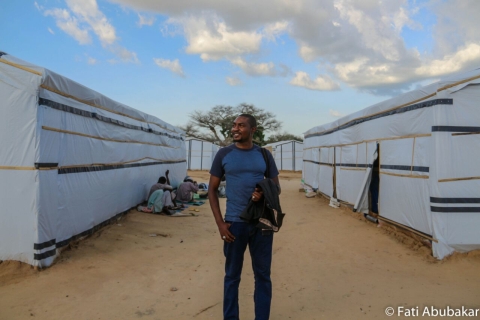
Abubakar Ibrahim, a Nigerian reporter and editor whose work conveys the human toll of terrorism and displacement, has been named winner of the 2018 Michael Elliott Award for Excellence in African Storytelling. A distinguished jury selected him from among 238 applicants for this prize.
The prestigious award is given by the International Center for Journalists (ICFJ) in partnership with ONE and the Elliott family. It was established in 2016 in honor of Michael Elliott, an outstanding editor and philanthropist whose life was a testament to the power of storytelling to bear witness to and improve the human condition. The prize aims to advance the work of an emerging journalist covering Africa who strives to strengthen people’s voices and improve their well-being. The inaugural winner was Kenyan health reporter Mercy Juma.
Ibrahim works as a news editor at the Daily Trust in Abuja, Nigeria. His story All That Was Familiar, published in Granta magazine in May 2017 puts a human face on a story often expressed in numbers: More than 2 million people from northeastern Nigeria, northern Cameroon and southern Niger have been internally displaced since Boko Haram began its insurgency. Ibrahim tells about the struggle of two women, one from Cameroon and one from Nigeria, to find their loved ones and return home.
“Mike would be thrilled by the breadth and depth of talent displayed by the entrants for this year’s award,” said Emma Oxford, Elliott’s widow. “The Elliott family, along with ONE, ICFJ and many generous supporters, is proud to help support the development of quality journalism in Africa. I am hugely grateful to the staff of ICFJ and my fellow judges for their thoughtful review of the broad range of entries.”
The winning story “exemplifies outstanding storytelling on a difficult and important topic. Abubakar’s fearless reporting and powerful writing brought home to me the hardships faced by women, in particular, displaced by the scourge of Boko Haram,” Oxford said.
Two broadcast journalists were commended as finalists for the award: Lindile Yolisa Mpanza of South Africa’s SABC Digital news, for her report on sexual abuse of widows; and Ridwan Karim Dini-Osman of Ghana’s GHOne, for his coverage of a community in crisis because its drinking water is contaminated.
Ibrahim will receive the award and a cash prize at a reception in New York on May 24. He also will spend time in U.S. newsrooms to learn new skills and share knowledge in an intensive, customized program run by ICFJ. The goal is to help to deepen future reporting that engages and empowers Africans. The international panel that selected Ibrahim was chaired by Norman Pearlstine, chief information architect, Money.net and former vice chairman of Time Inc., and included:
- Lionel Barber, editor, Financial Times
- Joyce Barnathan, president, International Center for Journalists
- Matthew Bishop, managing director, Bellagio Center, The Rockefeller Foundation
- Joachim Buwembo, former ICFJ Knight Fellow based in Uganda
- Erik Charas, founder, @Verdade newspaper based in Mozambique and member of ONE's Africa Policy Advisory Board
- Kate Critchley, interim executive director, Europe department, ONE
- Nic Dawes, deputy executive director for media, Human Rights Watch, and member of ONE's Africa Policy Advisory Board
- Jamie Drummond, co-founder and executive director, global strategy, ONE
- Jerri Eddings, senior program director, ICFJ
- Daniel Franklin, executive editor, The Economist
- Mercy Juma, reporter, BBC Kenya and inaugural award winner
- Rik Kirkland, partner, Global Publishing, McKinsey & Company and ICFJ Director
- Chika Oduah, freelance journalist based in Senegal
- Declan Okpalaeke, former ICFJ Knight Fellow based in Nigeria
- Emma Oxford, author, “At Least We Lived”
Elliott served as a top editor at The Economist, Newsweek and Time before becoming CEO of ONE. A passionate writer and editor with a gift for unraveling complex issues, he shone a light on global development issues and the people at their center.
A longtime board member of ICFJ, Elliott championed great journalism as a tool for empowerment. As ONE’s CEO, he lobbied to improve the lives of all Africans. Shortly before his untimely death in 2016, he spoke of his dream to establish an award that would bring together his belief in great journalism with his commitment to progress in Africa.